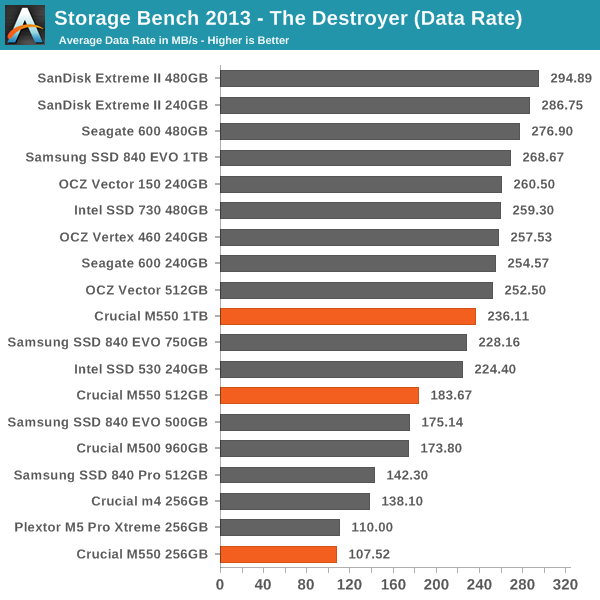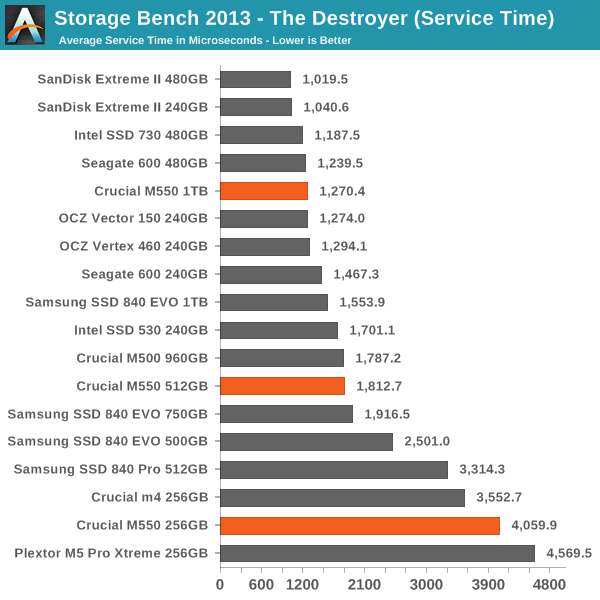Crucial M550 Review: 128GB, 256GB, 512GB and 1TB Models Tested
by Kristian Vättö on March 18, 2014 8:00 AM ESTAnandTech Storage Bench 2013
Our Storage Bench 2013 focuses on worst-case multitasking and IO consistency. Similar to our earlier Storage Benches, the test is still application trace based—we record all IO requests made to a test system and play them back on the drive we're testing and run statistical analysis on the drive's responses. There are 49.8 million IO operations in total with 1583.0GB of reads and 875.6GB of writes. As some of you have asked, I'm not including the full description of the test for better readability, so make sure to read our Storage Bench 2013 introduction for the full details.
| AnandTech Storage Bench 2013 - The Destroyer | ||
| Workload | Description | Applications Used |
| Photo Sync/Editing | Import images, edit, export | Adobe Photoshop CS6, Adobe Lightroom 4, Dropbox |
| Gaming | Download/install games, play games | Steam, Deus Ex, Skyrim, Starcraft 2, BioShock Infinite |
| Virtualization | Run/manage VM, use general apps inside VM | VirtualBox |
| General Productivity | Browse the web, manage local email, copy files, encrypt/decrypt files, backup system, download content, virus/malware scan | Chrome, IE10, Outlook, Windows 8, AxCrypt, uTorrent, AdAware |
| Video Playback | Copy and watch movies | Windows 8 |
| Application Development | Compile projects, check out code, download code samples | Visual Studio 2012 |
We are reporting two primary metrics with the Destroyer: average data rate in MB/s and average service time in microseconds. The former gives you an idea of the throughput of the drive during the time that it was running the test workload. This can be a very good indication of overall performance. What average data rate doesn't do a good job of is taking into account response time of very bursty (read: high queue depth) IO. By reporting average service time we heavily weigh latency for queued IOs. You'll note that this is a metric we've been reporting in our enterprise benchmarks for a while now. With the client tests maturing, the time was right for a little convergence.

The relatively poor IO consistency shows up in our Storage Bench 2013 as well. We are looking at about Samsung SSD 840 EVO level performance here (when taking the difference in over-provisioning into account), which is certainly a step up from the M500 but in the end the M550 is just a mediocre performer.











100 Comments
View All Comments
anh14 - Thursday, March 20, 2014 - link
you nailed that ; all differences are just academic . Everyone always talks about 'faster' but not about how preventing it of making your computer slower i.e. taking your storage of the critical paththe only thing with the earlier SSD's are some of them become excessively slow and resetting them is a pain.
I have a stack of patriots 32Gb that are collecting dust and that OCZ Vertex 2 64 SSD, interesting you mentioned it, I do have that one still but it is my backup C-disk that is in my drawer (e.g. if things go south, I replace the intel 520 I am now using have with this guy which is still better than any slow poke HD)
nathanddrews - Tuesday, March 18, 2014 - link
Coming from a HDD, any modern SSD will be subjectively comparable. Unless you've got a really read or write heavy task, it's really just splitting hairs. I've owned eight SSDs since I bought my first 80GB Intel SSD and I still have all of them in working order (only the largest/newest ones are boot drives, the rest are in external enclosures or serve as scratch drives). Anyway, until we get an interface with considerably higher speed (1-2GBps) and a cost per GB of $0.25 (2TB SSD for $500), the SSD market is just boring IMO.hojnikb - Tuesday, March 18, 2014 - link
We are already headed to sata-express + flash is rapidly getting cheaper nowdays, so 2TB ssd for a reasonable price is not that far away. Another dieshrink (so we get 256Gbit dies) and maturing of sata-express controllers and this will become a reality.jospoortvliet - Thursday, March 20, 2014 - link
Prices haven't really been going down all that fast lately so I wouldn't count on it anytime soon.dishayu - Thursday, March 20, 2014 - link
Sadly,I have to agree with this. I bought a 128GB Plextor M5 in mid 2012 for 84$. That's still the price point where 128GB SSDs sell today.hojnikb - Thursday, March 20, 2014 - link
You do realize u got a heck of a deal for that ssd, right ?Death666Angel - Friday, March 21, 2014 - link
Prices for small capacity SSDs have been relatively stable, but the 256/512 sizes have really dropped. I remember buying a 500GB Samsung 840 for 320€ (December 2012) and the equivalent Evo 500GB now costs 210€.hojnikb - Thursday, March 20, 2014 - link
I disagree.Just check m500 prices lately..
HisDivineOrder - Tuesday, March 18, 2014 - link
Pricing is the thing they need. Performance gets ridiculous past a certain point with the given ports we have.GASOLINENL - Tuesday, March 18, 2014 - link
I read a very technical article about this. In theorie SSD's survive 75 years. Due to different things a very heavy user (lots of writing etc) will kill a SSD after 25!!!! years. So they are great.